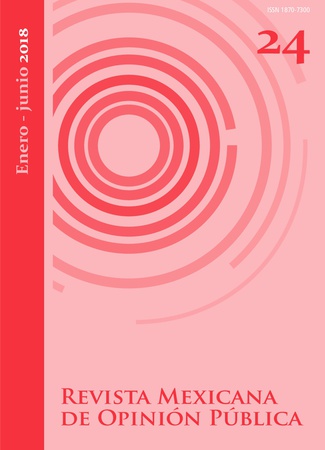Campaigns and Media in Developing Democracies. Effects of the First Presidential Debate in the 2015 Argentine Election
Main Article Content
Abstract
Article Details
Citas en Dimensions Service
References
Ansolabehere, Stephen y Shanto Iyengar, “Can the Press Monitor Campaign Advertising? An Experimental Study, The Harvard International Journal of Press/Politics, vol.1, núm. 1, 1996, pp. 72-86.
Aruguete, Natalia, El poder de la agenda. Política, medios y público, Biblos, Buenos Aires, 2015.
Bartels, Larry, “Uninformed Voters. Information Effects on Presidential Elections”, American Journal of Political Science, núm. 40, febrero,1996, pp. 194-230.
Bennett, W. Lance y Jarol Manheim, “The One-Step Flow of Communication”, The annals of the American Academy of Political and Social Science, núm. 608, noviembre, 2006, pp. 213-232. doi: 10.1177/0002716206292266 [fecha de consulta: 20 de agosto, 2017].
Bennett, W. Lance y Shanto Iyengar, “A New Era of Minimal Effects? The Changing Foundations of Political Communication”, Journal of Communication, núm. 58, 2008, pp. 707–731.
Berelson, Bernard, Paul F. Lazarsfeld y William N. McPhee, Voting. A Study of Opinion Formation in a Presidential Campaign, University of Chicago Press, Chicago, 1954.
D’Adamo, Orlando “¿Cómo decide su voto la gente?”. Disponible en http://www.condistintosacentos.com/como-decide-su-voto-la-gente/ [fecha de consulta: mayo, 2017].
D’Adamo, Orlando, Virginia García Beaudoux y Flavia Freidenberg, Medios de comunicación, efectos políticos y opinión pública. Una imagen, ¿vale más que mil palabras?, Universidad de de Belgrano, Buenos Aires, 2000.
Festinger, Leon, A Theory of Cognitive Dissonance, Stanford University Press, Stanford, California, 1957.
Holbrook, Thomas M., “Political Learning from Presidential Debates”, Political Behavior, vol. 21, núm. 1, marzo, 1999, pp. 67-89.
Holbrook, Thomas M., “Presidential Campaigns and the Knowledge Gap”, Political Communication, vol. 19, núm. 4, 2002, pp. 437-454.
Iacus, Stefano, Gary King y Giuseppe Porro, “Causal Inference Without Balance Checking. Coarsened Exact Matching”, Political Analysis, vol. 20, núm. 1, 2012, pp. 1-24.
Iyengar, Shanto y Adam F. Simon, “New Perspectives and Evidence on Political Communication and Campaign Effects”, Annual Review of Psychology, vol. 51, núm.1, 2000, pp. 149-169.
Katz, Elihu y Paul F. Lazarsfeld, Personal Influence. The Part Played by People in the Flow of Communication, Free Press, Nueva York, 1955.
Klapper, Joseph T., The Effects of Mass Communication, Free Press, Nueva York, 1960.
Lang, Kurt y Gladys Lang, “The Mass Media and Voting”, en Eugene L. Burdick y A.J. Brodbeck (eds.), American Voting Behavior, vol. 3, Free Press, Glencoe, 1959, pp. 217-235.
Lasswell, Harold, Propaganda Technique in the World War, The Michigan University Press, Nueva York, 1927.
Lawson, Chappell y James MacCann, “Television News, Mexico’s 2000 Elections and Media Effects in Emerging Democracies”, British Journal of Political Science, núm. 35, 2005, pp. 1-30.
Lazarsfeld, Paul F., “The Election Is Over”, Public Opinion Quarterly, vol. 8, núm. 3, otoño, 1944, pp. 317-330.
Lazarsfeld, Paul F., Bernard Berelson y Hazel Gaudet, The People’s Choice. How the Voter Makes Up His Mind in a Presidential Campaign, Columbia University Press, Nueva York, 1948.
Lodola, Germán, “El votante Argentino”, Revista saap, vol. 7, núm. 2, noviembre, 2013, pp. 379-388.
Lupu, Noam, “Brand Dilution and the Breakdown of Political Parties in Latin America”, Latin America World Politics, vol. 66, núm. 4, 2014, pp., 561-602.
McCombs, Maxwell y Donald L. Shaw, “The Agenda-Setting Function of Mass Media”, The Public Opinion Quarterly, vol. 36, núm. 2, verano, 1972, pp. 176-187.
Mitchelstein, Eugenia, Minimal Effects vs. Resonance Model. A Test of Media Influence During the Presidential Campaigns in Brazil and Argentina, manuscrito inédito, 2017.
Tagina, María Laura, “Consumo de medios y decisión de voto en Argentina. Analizando el impacto de la exposición a los noticieros de TV”, paper presentado en la Universidad de San Andrés, octubre de 2014. Trabaj

Revista Mexicana de Opinión Pública por Universidad Nacional Autónoma de México se distribuye bajo una Licencia Creative Commons Atribución-NoComercial-SinDerivar 4.0 Internacional.
Basada en una obra en http://revistas.unam.mx/index.php/rmop.




